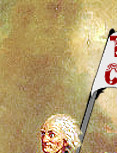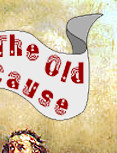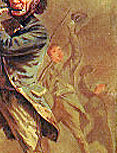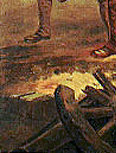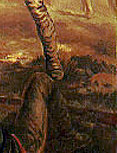Johnson,
as some readers will know, recently wrote a critique
of US foreign policy called Blowback,2
after a clever CIA term for what the rest of us think
of as unintended but not exactly unforeseeable
consequences. As a scholar trained in Asian studies
and sometime advisor to various US agencies during
the late, much-missed Cold War, Professor Johnson
knows whereof he speaks.
‘INDISPENSABLE
NATION’
Early
in the interview, Johnson remarks that leaders of
both parties now contending for the presidency believe
in the same US world mission. The US elite "seeks
to extend its might into every corner of the earth"
to bring about a particular "world economic system,"
whatever this costs other countries.3
I will only add that, whatever else this economic
world system may be, it can hardly be seen as the
logical result of private property, markets, and trade,
as such. Notions like neo-mercantilist imperialism
come quickly to mind.
Yet
every empire has run into trouble, in time. The late
Soviet Union fell because of "imperial over-extension,"
not because of "competition with the USA or an
incapacity for reform" (my emphasis). But America
– one assumes Johnson means US leaders –
has "little talent for change," yet thinks
itself "immune to Russia’s fate." Forgetful
of historical pattern, US leaders remain "arrogant,
overweening, self-confident."
TROUBLE,
RIGHT HERE IN RIVER CITY
As
for the so-called US budget surplus, the US military
– "on the road to becoming an autonomous
system – would love to spend very dollar of it."
The inevitable end of the current economic boom will
curtail such ambitions. Johnson believes it is a sign
of economic ill health that the US – a country
with a developed economy – imports massive amounts
of capital as against investing its own savings. In
today’s US economy, such savings do not exist.
There
are few signs of true American economic renewal. Immigration
of talented people into the US may be one. But overall,
for Johnson, the outlook is grim.
COLD
WARRIORS WHISTLING PAST THE CEMETERY...
Asked
how such things came to be, Johnson answers that it
comes from having "held on to the structures
of the Cold War." In East Asia, the US maintains
various protectorates, sovereign in name, and "keeps
them in line as clients" through market-rigging
(my term). He dares to suggest that the Cold War was
not just "a policy of containment or a reaction
to the Soviet threat" but was also about "the
development and maintenance of the US-Imperium, especially
in East Asia."
Johnson
observes that by the late 1940s the US National Security
Council was already discussing "creation of a
global capitalist system under US leadership."
Here the former state advisor finds himself in agreement
with critics like Carl Oglesby, William
Appleman Williams, Murray
Rothbard, and Noam Chomsky. The Clinton administration
simply re-christened the imperial "project"
and added the goal of making the world over in their
special image of America.
NEVERTHELESS,
IT REMAINS SPINACH
Johnson
notes the US preference for euphemisms, such that
empire becomes "the free world" or "globalization."
The first is wholly lovable, the second inexorable.
Such terms actually refer to economic expansion "on
US terms and for free trade, as long as the latter
benefits us [America]" (my emphasis)" But
such a large-scale program "must call forth opposition
to a state which keeps up 65 major military strongholds
worldwide." I note, to one side, that Johnson
might want to add "free trade" to the list
of euphemisms on hand in US politics.
CHICKENS
OF THE INTERVENTIONIST LIBERALS COMING HOME TO ROOST
Resentful
of US meddling, opponents begin to strike back. This
is "blowback."
Using
"terrorism, the weapon of the weak," self-organized
little groups attack under-defended targets belonging
to the great power which has harmed them. Such attacks
– like that on the USS Cole – take the empire
by surprise, since, "typically, world powers
have a short memory of things which they have done
to other peoples."
It
is a matter of reaping what US leaders have sowed,
says Johnson. But "our politicians, lulled by
absurd wealth, are third class." Thus the US
"props up its power with cruise missiles, aircraft
carriers and financial manipulations instead of resorting
to diplomacy, development aid, and international law."
At the heart of this super power "without brains"
stands "the most corrupt capital in the western
hemisphere." Its disappearance off the earth
would hardly be noticed in, say, California.
A
SINGLE-PARTY STATE
As
for politicians, there is little to hope for from
them. Bush "stands for a macho unilateralism."
His advisors are unreformed Reaganite Cold Warriors
who wish to build an unnecessary missile defense system
while needling Russia and China. This would be "extremely
dangerous." As for Gore, he manages to represent
the best and the worst in US foreign policy, simultaneously.
UNCIVILIZED
NEO-ROMANS
Pending
the inevitable decline of US power as a result of
over-extension, US leaders wish to "play the
role of an ersatz Rome." But the Pax Romana
"was in a certain measure the expression of civilization
rather than of empire." Johnson asks, who –
"leaving aside rock music fans" – would
look for any connection between the US empire and
civilization?
This
is a good question, as are others to which Johnson
has turned his mind. Readers who find my summary of
this interview interesting may want to consult Blowback.
We have few enough critics of empire as it is. We
certainly ought to heed them.
Notes

